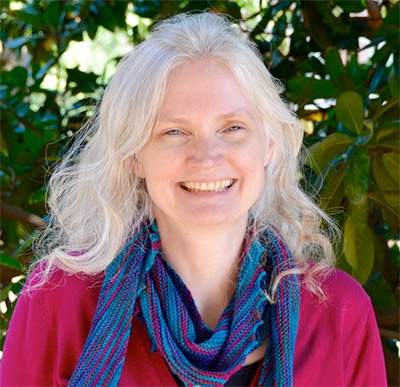From Punnett Squares to Population Health

KL2 scholar Kristin Young fell in love in high school, not with a boy, but with a discipline. The first time she learned about Punnett squares — those beautifully simple 4x4 grids that enable geneticists to predict the inheritance of traits like eye color or diseases like cystic fibrosis — she was hooked. In college, she studied zoology, the only major at the time that included classes in genetics. Then she fell in love all over again when she took a class in anthropology, a field that transcended DNA and inheritance and took a holistic look at what makes us human.
Young went on to graduate school at the University of Kansas, where she combined her two loves to get a PhD in anthropological genetics. Today, she is a Research Assistant Professor of Epidemiology at UNC-Chapel Hill, where she studies the interaction between genes and environment and how that influences the human condition. Scientists have long debated the role of nature versus nurture in health and disease, and the more they learn, the clearer it becomes that most aspects of humanity cannot be solely attributed to one or the other.
Unlike single-gene disorders such as cystic fibrosis or forms of muscular dystrophy, more common conditions like obesity, heart disease, and mental illness involve many genes, each individually contributing a tiny amount but cumulatively tipping the scales in favor of a particular disease or ailment. "On top of that, there are a number of environmental influences that can affect your genetic predisposition," says Young. "So if you happen to grow up in a family that is super physically active, even though you have a genetic predisposition for a high BMI you may not ever become obese. It's the genetics but it's also the environment, and that's what interests me."
One of the first projects Young undertook after coming to UNC involved looking at the effects that a common environmental insult – smoking – could have on the genetic predisposition to obesity. Adolescents are particularly vulnerable to both weight gain and risky behaviors like smoking. So she tapped into data from the National Longitudinal Study of Adolescent to Adult Health (Add Health), a nationally-representative sample of US adolescents who have been followed into adulthood. Young tested 40 different genetic variants already associated with body mass index (BMI) and found a couple of variants whose effect was exacerbated by smoking. The impact of smoking on BMI was even worse for females, uncovering a previously underappreciated gender disparity.
As a KL2 scholar, Young is training in the laboratory of Karen Mohlke, a geneticist at UNC-Chapel Hill who studies the genetic underpinnings of traits like diabetes and obesity. Through an international consortium called GIANT (Genetic Investigation of Anthropomorphic Traits), Mohlke and her collaborators have pinpointed nearly 400 different regions scattered across the human genome that appear to play a role in obesity. However, it is not clear which variants in these regions are actually responsible for the condition, and exactly how they influence genes that lead people to put on weight.
Young is following up on a few of these variants, examining their effects in cultured fat cells to see what kind of functional differences, if any, exist between cells that carry different variant nucleotides. Any insights she gains into the genes and biological processes involved in obesity could lead to new therapies for weight loss, and help doctors personalize treatment options for their patients.
"I want to know why," says Young. Why do some people struggle with their weight? Why is obesity a bigger problem in people of certain ancestries or socioeconomic backgrounds? "That's what gets me up in the morning."
She credits the UNC-Chapel Hill NC TraCS Institute KL2 program with setting her on the path to become an independent scientist. The program provides academic and career development, including didactic coursework, laboratory training, professional development, and grant writing support.
"We have a K seminar that I've been in since the first year, where we go in and work through people's grants and give them feedback, and that has been super helpful," said Young, who is in her third year of the program. "Being in that room with other K scholars, many of whom have gone on to funded faculty positions at this point, has been a tremendous opportunity that I would not have had otherwise."
She hopes to build a truly interdisciplinary career focused on understanding the genetic and environmental factors influencing health disparities that contribute to obesity and related conditions. It is such a challenging field of study — drawing upon genomics, population genetics, informatics, statistics, and epidemiology — that one wonders if Young finds herself missing those old Punnett squares.
"The Punnett squares were certainly simpler," she laughs. "But the more I learn about genetics and the more science I do, the more excited I am by how much we still have to learn. Each time we find an answer we also uncover lots more questions."
- Created on .